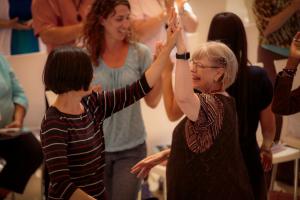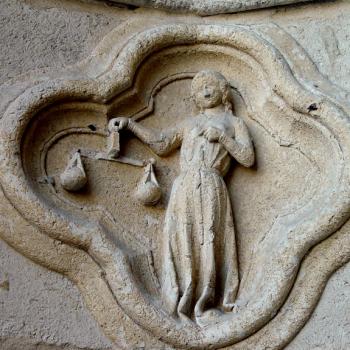
At the heart of Christian praxis is love, a love for God and a love for one’s neighbor. If we love someone, we will want to know about them, and the more we know about them, the more we will discern things about them to love. There are many ways we can come to know someone. We can watch them and what they do. We can talk to them. We can listen to them and what they have to say. But a desert father suggested another way, an unusual way, one which we might not initially consider, and that is praise them: “An elder said, ‘If you wish to learn about a neighbour, praise him more than you criticize him.’”[1]
When we praise someone, we do so by focusing on all the good which we see coming from them, the good which show us, deep down, who and what they are. Everyone is good by nature, and who someone is as a person, when their true self is discovered, is a reflection and engagement of that good. Sadly, due to sin, that good is often obscured. Their true self, just like our true self, becomes obscured by poor choices leading to bad actions; what is established is like a mask, one which presents itself as the true self but is not, making it difficult for us and others to get to know who they really are underneath all that obscuration. But, to be sure, the more they act poorly, the more that mask becomes established, the more they themselves begin to believe the masks represents who they are, as they end up not knowing themselves. By focusing on the good which we do see, the good which cannot and has not been obscured, and praising it, we not only get a glimpse of the person underneath that mask. we give them a chance to see and know something of their true selves as well. Hopefully, when they get to know themselves better, to know their true self and the good which has been hidden, they will further engage that good, let it grow, and through it, slowly cast off the mask which sin has created for them.
Sadly, however, that does not always happen. Often, when people are praised, instead of focusing on the good which people praise the for, and using that to help cast aside their false self, they use the praise to reinforce the false self itself. That is, they become prideful and vainglorious. Then, they still reveal something to us, but what they reveal is not their true self, but their false self and how their false self engages the world. It shows us how the false self, like sin, tries to use the good as the source of its being, but upon taking it, it corrupts or distorts the good, using the distortion as a part of its own self-presentation. That this can and often does happen does not mean we should stop praising people for the good they do, but we must make sure we praise them in the proper fashion, showing them more and more of the good which they can accomplish if they cast away the pride and vainglory which would corrupt it, hindering their own proper growth. Thus, while this is a possible danger with praise, the elder would say that criticism doesn’t fare any better, indeed, it fares much worse, as those who find themselves constantly being criticized tend to become defensive and double-down on those things about which they are being criticized (especially if the people criticizing them do so out of reasons other than pure charity).
The anonymous elder put into words what every lover should know: those who love someone will praise their beloved as they explain why their beloved is loved by them. The more they do so, the more they are drawn to their beloved, and the more they are drawn to their beloved, the more qualities they will find attractive and worthy of praise. This is why those who believe in and love God end up praising God. They do so, not out of fear, thinking God demands it and will punish them if they do not offer it, but rather, they do it to get to know God more, to be drawn closer and closer to God, hoping by doing so they will apprehend more of God’s glory for themselves. The more they love God, the more they will love what God loves. They will love the world and all that is in it because God loves it. They will love their neighbor, because, once again, God loves them. They will act out of that love, often doing so in creative ways, but all with the intent to support and promote their dignity. This is why they will often help their neighbor in ways which their neighbor does not know about so that their neighbor does not end up feeling ashamed for taking in and receiving such help. Thus, it should not be surprising to find examples from the desert father and mothers where we find ascetics helping their neighbors so as to make sure their neighbors do not feel bad about receiving such help, such as in the way an anonymous monk is said to have helped a widow:
A brother went to buy linen from a widow, and when she was selling it to him, she sighed. The brother said to her, ‘What is the matter with you?’ The widow said to him, ‘God has sent you today so that my orphans may be fed.’ When that brother heard [this] he was distressed, and secretly took from his own linen and threw [it] on the widow’s side of the scales until he had fulfilled [an act of charity] towards her.[2]
The monk covered the widow, and the orphans, with his love, doing so in such a way that they did not know how much extra he gave them. What the monk did for them, God often does for us. God is always at work helping us, giving us the grace we need, often in ways (and places) which we do not suspect. For the monk here exemplifies the way God often works, that is, God likes go help us in secret ways so that we can keep our own dignity. Let us, therefore, learn from this, and find ways we can help those who need our love, doing so in such a way their good is confirmed by us by our praise, but also by how we help them in secret so they do not lose their own sense of personal dignity. For in doing so, we can come to know them better, but also, by doing so, we show God more and more love, allowing us to come to know God better.
[1] More Sayings of the Desert Fathers. An English Translation And Notes. Ed. John Wortley (Cambridge: Cambridge University Press, 2019; repr. 2023), 88 [“Sayings Preserved in Syriac”: S80].
[2] More Sayings of the Desert Fathers, 73 [“Sayings Preserved in Syriac”: S22].
Stay in touch! Like A Little Bit of Nothing on Facebook.
If you liked what you read, please consider sharing it with your friends and family!
N.B.: While I read comments to moderate them, I rarely respond to them. If I don’t respond to your comment directly, don’t assume I am unthankful for it. I appreciate it. But I want readers to feel free to ask questions, and hopefully, dialogue with each other. I have shared what I wanted to say, though some responses will get a brief reply by me, or, if I find it interesting and something I can engage fully, as the foundation for another post. I have had many posts inspired or improved upon thanks to my readers.













